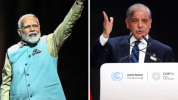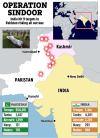army judge
Moderator

Islamabad — Air raid sirens blared in many locations across India on Wednesday afternoon after Pakistan vowed to retaliate for Indian missile strikes that hit several places in Pakistani territory earlier in the day. The sirens were part of nationwide preparedness exercises being held by India, as Pakistan considered its response to the missile strike and violence across the countries' disputed border claimed more lives.
India fired missiles into Pakistan and Pakistani-administered Kashmir early Wednesday, and there were fierce clashes along the Line of Control in Kashmir, killing at least 31 people including a child, according to Indian officials.
Pakistan's leader called the missile salvo an act of war. India said it had struck infrastructure used by militants linked to last month's massacre of tourists in the Indian-administered portion of Kashmir, a disputed mountainous region that the nuclear-armed neighbors have fought two previous wars over.
Pakistan said it had shot down several Indian fighter jets in retaliation, and three planes fell onto villages in India-administered Kashmir, according to local media and witnesses.
Tension has soared between India and Pakistan since the terrorist attack in which gunmen killed 26 people, mostly Indian Hindu tourists, in a popular meadow in Kashmir, in some cases killing men as their wives looked on. India has blamed Pakistan for backing the attack, something Islamabad has denied.
As the tension mounted on Wednesday, India held security exercises to prepare security forces, first responders and civilians for the eventuality of a Pakistani counterattack. India was also holding simulations on Wednesday for potential blackouts, and rehearsals for mass evacuations across the country.
Several Indian states planned civil defense drills for Wednesday, according to India's home ministry, to train civilians and security personnel to respond in case of any "hostile attacks," the ministry said in a statement. Such drills in India are rare in non-crisis times.
Kashmir, which is divided between the neighboring nations but claimed in its entirety by each, has been at the center of tension for decades.
Pakistan's Prime Minister Shehbaz Sharif condemned Wednesday's airstrikes and said earlier that his country would retaliate at the time of its choosing.
"Pakistan has every right to give a robust response to this act of war imposed by India, and a strong response is indeed being given," Sharif said.
The country's National Security Committee met Wednesday morning, and Pakistan summoned India's charge d'affaires to lodge a protest.
In a security alert posted online Wednesday, the U.S. diplomatic mission in Pakistan said it was aware of reports of Indian strikes in the country, saying it "remains an evolving situation, and we are closely monitoring developments."
The alert reminded U.S. nationals of the standing "Do Not Travel" advisory for "areas in the vicinity of the India-Pakistan border and the Line of Control due to terrorism and the potential for armed conflict," as well as a broader warning for Americans to "Reconsider Travel" to all of Pakistan. The alert noted that Pakistani airspace was closed and many flights canceled.
"We advise U.S. citizens to depart areas of active conflict if they can safely do so, or to shelter in place," the alert said, along with a number of other recommendations.
There was, however, a little hope for de-escalation as Pakistan reportedly reopened airports in several major cities on Wednesday afternoon, after the Indian strikes. Pakistani media said airports in Islamabad, Lahore and Karachi were operating again after all traffic was halted overnight. Pakistani authorities did not immediately confirm a lifting of the restrictions on air traffic.
Speaking with CBS News on the phone Wednesday morning from Islamabad International Airport, passenger Dr. Wali Khan said the resumption of flights was helping to put him at ease after the spike in tension overnight.
"I was extremely worried about my Wednesday night flight, but now I feel more relaxed after being informed by the airline that my takeoff will go ahead as originally scheduled," he said.
In India, Prime Minister Narendra Modi held a special meeting of the Cabinet Committee on Security. A source told the Reuters news agency Modi postponed a trip to Croatia, the Netherlands and Norway.
South Asia analyst Michael Kugelman said it was one the highest-intensity strikes from India on its rival in years and that Pakistan's response would "surely pack a punch as well."
"These are two strong militaries that, even with nuclear weapons as a deterrent, are not afraid to deploy sizeable levels of conventional military force against each other," Kugelman said. "The escalation risks are real. And they could well increase, and quickly."
Indian politicians from different political parties lauded the strikes. "Victory to Mother India," India's defense minister, Rajnath Singh, wrote on X. India's main opposition Congress party called for national unity and said it was "extremely proud" of the country's army. "We applaud their resolute resolve and courage," Congress party president Mallikarjun Kharge said.
Stephane Dujarric, the United Nations spokesperson, said in a statement late Tuesday that Secretary-General Antonio Guterres called for maximum restraint because the world could not "afford a military confrontation" between India and Pakistan.
Details on the military action
India's army said the operation was named "Sindoor," a Hindi word for the bright red vermillion powder worn by married Hindu women on their forehead and hair, referring to the women whose husbands were killed in front of them.India's missiles hit six locations in Pakistan-administered Kashmir and in the country's eastern Punjab province, killing at least 26 people including women and children, said Pakistan's military spokesperson, Lt. Gen. Ahmed Sharif.
Officials said another 38 people were injured by the strikes, and another five people were killed in Pakistan during exchanges of fire across the border later in the day.
Sharif said the Indian jets also damaged infrastructure at a dam in Pakistan-administered Kashmir, calling it a violation of international norms.
India's Defense Ministry said the strikes targeted at least nine sites "where terrorist attacks against India have been planned."
"Our actions have been focused, measured and non-escalatory in nature. No Pakistan military facilities have been targeted," the statement said, adding that "India has demonstrated considerable restraint."
Pakistan said the strikes hit at least two sites previously tied to banned militant groups.
One hit the Subhan Mosque in Punjab's Bahawalpur city, killing 13 people including a child, according to Zohaib Ahmed, a doctor at a nearby hospital. The mosque is near a seminary that was once the central office of Jaish-e-Mohammed, a militant group outlawed in 2002. Officials say the group has had no operational presence at the site since the ban.
In a statement obtained by CBS News, Jaish-e-Mohammed's chief, Maulana Masood Azhar, claimed India's attack killed 10 of his family members and four close associates. He criticized Modi, saying, "This cruelty has broken all limits—do not expect mercy anymore."
Another missile hit a mosque in Muridke, damaging its structure. A sprawling building located nearby served as the headquarters of Lashkar-e-Taiba until 2013, when Pakistan banned the group and arrested its founder.
Last month's attack on tourists was claimed by a group calling itself the Kashmir Resistance, which India says is also known as The Resistance Front and is linked to Lashkar-e-Taiba.
In Muzaffarabad, the main city of Pakistan-controlled Kashmir, resident Abdul Sammad said he heard several explosions as the blast ripped through houses. He saw people running in panic and authorities immediately cut power to the area.
People took refuge on the streets and in open areas, fearful of what might happen. "We were afraid the next missile might hit our house," said Mohammad Ashraf.
Chaudhry Ghulam Rasool, who lives near the mosque, told CBS News, "We were just about to go to bed when a huge blast happened. It was very big and terrifying explosions."
Along the Line of Control, which divides the disputed region of Kashmir between India and Pakistan, there were heavy exchanges of fire.
The Indian police and medics said seven civilians were killed and 30 wounded by Pakistani shelling in Poonch district near the highly militarized Line of Control, the de facto border that divides disputed Kashmir between the two countries. Officials said several homes also were damaged in the shelling.
The Indian army said Pakistani troops "resorted to arbitrary firing," including gunfire and artillery shelling, across the frontier.
Shortly after India's strikes, aircraft fell onto three villages in India-controlled Kashmir.
Sharif, the Pakistani military spokesperson, said the country's air force shot down five Indian jets in retaliation for the strikes. There was no immediate comment from India about Pakistan's claim.
Debris from a plane was scattered across Wuyan village in the outskirts of the region's main city, including in a school and a mosque compound, according to Srinagar police and residents. Firefighters struggled for hours to douse the resulting fires.
"There was a huge fire in the sky. Then we heard several blasts also," said Mohammed Yousuf Dar, a Wuyan resident.
Another aircraft fell in an open field in Bhardha Kalan village, near the Line of Control in Indian-controlled Kashmir.
Village resident Sachin Kumar told The Associated Press he heard massive blasts followed by a huge ball of fire.
Kumar said he and and several other villagers rushed to the scene and found two pilots with injuries. Both were later taken away by the Indian army.
A third aircraft crashed in a farm field in India's northern Punjab state, a police office told the AP, speaking on the condition of anonymity as they were not authorized to speak to the media. The officer did not provide further details.
Other nations reacting
Speaking to reporters in the Oval Office on Tuesday, President Trump called the strikes "a shame.""We just heard about it just as we were walking in the doors of the Oval," Mr. Trump said. "I guess people knew something was going to happen based on a little bit of the past. They've been fighting for a long time. You know, they've been fighting for many many decades, and centuries actually, if you really think about it. No, I just hope it ends very quickly."
China called for restraint from both sides following India's strikes.
"China expresses regret over India's military actions this morning and is concerned about the current developments. China opposes all forms of terrorism," the Ministry of Foreign Affairs spokesperson said in a statement. "We call on both India and Pakistan to prioritize peace and stability, remain calm and restrained, and avoid taking actions that further complicate the situation."
Beijing is the largest investor in Pakistan by far, with a $65 billion China-Pakistan Economic Corridor project that spans across the country. China meanwhile also has multiple border claims disputed with India, with one of those claims in the northeastern part of the Kashmir region.French news agency AFP reports that British Trade Secretary Jonathan Reynolds told BBC Radio Wednesday the UK is "a friend, a partner to both countries. We stand ready to support both countries. Both have a huge interest in regional stability, in dialogue, in de-escalation and anything we can do to support that, we are here and willing to do."
Moscow on Wednesday called for both India and Pakistan to show "restraint," AFP says.
Arshad R. Zargar and Sami Yousafzai contributed to this report.

India preps for possible retaliation after hitting Pakistan with missile strike as Kashmir tension soars
Tension between the nuclear-armed nations is soaring. Pakistan's Shehbaz Sharif has vowed to retaliate after Indian strikes killed more than two dozen people.

